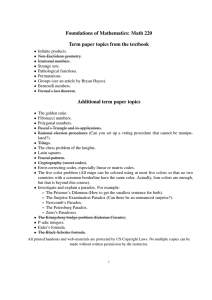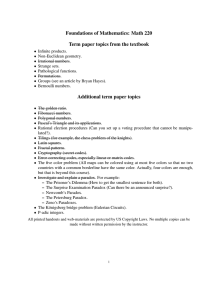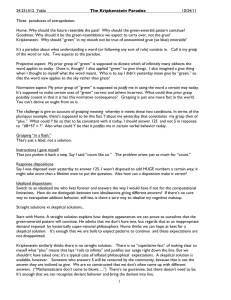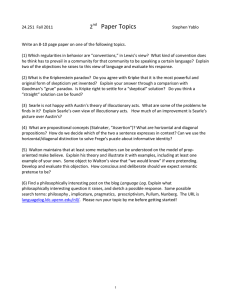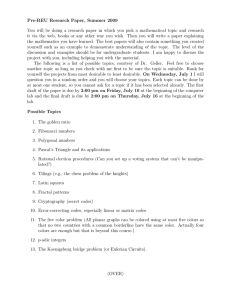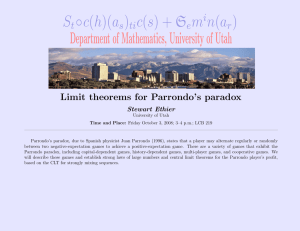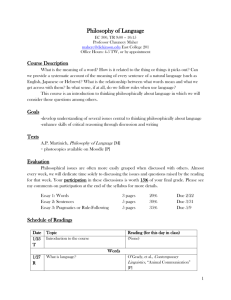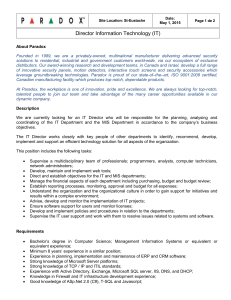Document 13520075
advertisement
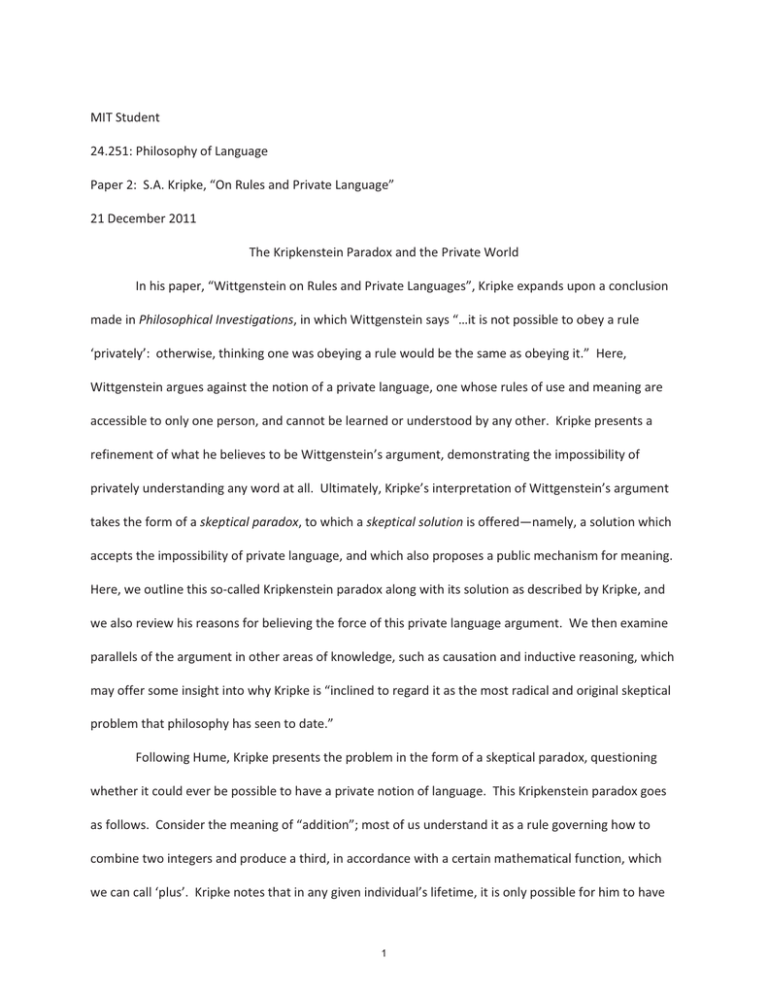
24.251: Philosophy of Language Paper 2: S.A. Kripke, “On Rules and Private Language” 21 December 2011 The Kripkenstein Paradox and the Private World In his paper, “Wittgenstein on Rules and Private Languages”, Kripke expands upon a conclusion made in Philosophical Investigations, in which Wittgenstein says “…it is not possible to obey a rule ‘privately’: otherwise, thinking one was obeying a rule would be the same as obeying it.” Here, Wittgenstein argues against the notion of a private language, one whose rules of use and meaning are accessible to only one person, and cannot be learned or understood by any other. Kripke presents a refinement of what he believes to be Wittgenstein’s argument, demonstrating the impossibility of privately understanding any word at all. Ultimately, Kripke’s interpretation of Wittgenstein’s argument takes the form of a skeptical paradox, to which a skeptical solution is offered—namely, a solution which accepts the impossibility of private language, and which also proposes a public mechanism for meaning. Here, we outline this so-called Kripkenstein paradox along with its solution as described by Kripke, and we also review his reasons for believing the force of this private language argument. We then examine parallels of the argument in other areas of knowledge, such as causation and inductive reasoning, which may offer some insight into why Kripke is “inclined to regard it as the most radical and original skeptical problem that philosophy has seen to date.” Following Hume, Kripke presents the problem in the form of a skeptical paradox, questioning whether it could ever be possible to have a private notion of language. This Kripkenstein paradox goes as follows. Consider the meaning of “addition”; most of us understand it as a rule governing how to combine two integers and produce a third, in accordance with a certain mathematical function, which we can call ‘plus’. Kripke notes that in any given individual’s lifetime, it is only possible for him to have performed a finite number of instances of addition. Nevertheless, when adding two novel numbers, he, like the rest of us, does not hesitate in giving a response, having apparently “grasped” the rule and how it can be applied to all instances. To take Kripke’s example, suppose ‘68+57’ is one such novel computation. We would certainly be surprised if any individual has problems asserting the correct answer to be ‘125’. But Kripke’s skeptic argues that, although this is the correct answer if his previous notion of addition were ‘plus’, he sees no reason why that previous notion of addition could not be ‘quus’, a mathematical function such that ‘x quus y’ is usually ‘x plus y’, except when x and y are ‘68’ and ‘57’, in which case it is just ‘5’. (Note that this is slightly different from Kripke’s presentation; in his version, the mathematical functions are ‘addition’ and ‘quus’ while the individual performs “plus”. The ‘quus’ here is also a bit different, taking on ‘5’ only in this specific case. None of these considerations are particular to the argument.) Now, according to the skeptic, the existence of the function ‘quus’ and its agreement with all the individual’s past instances of addition casts doubt on whether he should answer ‘125’ or ‘5’. Thus, the skeptic’s challenge requires two properties of our “grasp” of addition: (1) it dictates the correct answer for all possible inputs (it is “projective”), and (2) it justifies the use of ‘plus’ as applied to ‘68+57’ in this novel instance (it is “normative”). The skeptic challenges us to provide a fact, internal or otherwise, which has both of these properties, or else we cannot (as individuals doing addition) possibly mean anything by “addition”, for we apparently cannot grasp such a rule. Perhaps it is important to note, as Kripke does, that the issue is not a question of how we could ever know of ‘plus’ the mathematical function, and it is certainly not one about the nature of ‘plus’ either. Rather, the skeptic is questioning the belief that we are following the rule given by ‘plus’, since we could have been following the rule ‘quus’ instead. The paradox is that we feel very strongly that we are following ‘plus’ and not ‘quus’ when we do addition, even though nothing we have done in the past distinguishes them. When we first encounter ‘68+57’, the skeptic says we have no reason to pick one over the other, that our strong feeling of following one rule and not the other is mistaken. It is not a question about correctness, but rather assertion—if we could somehow establish that we do indeed mean ‘plus’, then answering ‘125’ is completely correct (and likewise for ‘quus’), but the point is that we cannot do this. It should also be clear that failure to answer the skeptic ultimately leads to the impossibility of private language. The argument is set up so that we look for the justifying fact with respect to the individual—we presume that it is possible for that individual to mean something definite by “addition”, either ‘plus’, ‘quus’, or otherwise. Failure to find such a fact implies that the individual does not, in fact, mean anything by addition—privately. Again following Hume, Kripke goes on to explain that he intends to give a skeptical solution, one which accepts the implications of the skeptical paradox, but which solves the problem by arguing that what the paradox refutes is irrelevant anyway. This contrasts with a straight solution, which would point out the flaw in the skeptic’s argument and thus resolve the paradox. By giving the skeptical solution, Kripke claims Wittgenstein accomplishes two goals: (1) he (happily) accepts the conclusion of the skeptical paradox that private language cannot have meaning, and (2) he dismisses the conclusion by arguing that language is public anyway (and hence the paradox does not matter). As Kripke writes, “the impossibility of private language emerges as a corollary of [Wittgenstein’s] skeptical solution of his own paradox…It turns out that the skeptical solution does not allow us to speak of a single individual, considered by himself and in isolation, as ever meaning anything.” Hence, in order to say whether an individual means ‘plus’ or ‘quus’, we must consider him in the context of a community of speakers, who justify his usage based on whether they agree or disagree. Having obtained the community’s agreement, the individual can then justifiably assert one meaning over another. Thus, as long as we consider individuals in isolation (not physical isolation, but as a selfcontained entity with a private language independent of any other individuals), we cannot explain why any individual can assert to mean a certain thing by a certain word, nor can we explain why he should be driven to mean a certain thing by a certain word. We might be able to see that the individual seems to “grasp” certain rules and has the feeling that he is following them, but we cannot interpret explain his actions without bringing in a community. Hence Kripke accepts the conclusion of the skeptical paradox, and intends instead to provide a public account of language, making the need for meaningful private language extraneous. The purpose of the community is to give the individual the power to assert and the obligation to conform—according to Kripke, “the failure of the individual to come up with the particular response the community regards as right leads the community to suppose that he is not following the rule.” Thus, to understand the very mechanism (the normative and projective aspects) behind how an individual follows rules, it is not sufficient to regard the individual by himself—we need to bring the community into the picture, in what Kripke calls a “public model” of language. In presenting a skeptical solution, Kripke claims that there is no straight solution available. Indeed, the argument is difficult to refute, as it clearly does not go away by simply presenting an algorithm, because that just pushes the problem to the steps themselves. Speaking of behavior dispositions does not help either; saying an individual is disposed to answer ‘125’ rather than ‘5’ is not strong enough to answer the skeptic’s challenges of justifiability. One possible way out might be to consider the particular example of ‘plus’ and ‘quus’: if an individual had meant ‘quus’ when he had (let us suppose) calculated ‘5+10’ previously, he might have needed to test whether ‘5’ and ‘10’ were ‘68’ and ‘57’, since that is a necessary part of meaning ‘quus’. (It would be exactly analogous to us testing whether two things were numbers before applying a mathematical function to them.) Perhaps it might be arguable in the case of addition that the absence of such a test requires that the individual meant exactly ‘plus’, for no other meaning would be compatible. Such mental discriminations would then be the fact the skeptic is looking for. Nevertheless, there are problems with this solution, as it does not generalize, and it could be argued that there are many other words with ambiguous meaning that does not depend on specific cases like that of ‘quus’. If we grant Kripke’s skeptical solution, however, we can draw parallels to other similar arguments. In his paper, Kripke brings up, of course, Hume, who first developed the skeptical solution argument in considering causation. Here, the conclusion is that it is not possible for two events X and Y, considered in isolation, to be causally linked, as the only claim we can make is that one happened after another. The resulting skeptical paradox that two events cannot be said to be causally connected is accepted by Hume, with the skeptical solution that we can speak of causality when we bring in other events. Thus, not only are the logical forms of the argument the same, but the results are almost precisely analogous. In Hume’s case, Kripke calls it “the impossibility of private causation.” Another example is Goodman’s paradox. Here, Goodman defines a color called “grue”, which is defined to be green before some fixed time t, but blue after t. The problem arises when we consider examining (say) a number of emeralds in succession. Typically, we consider all the emeralds “green”, even though, if t has not yet passed, we could just as well consider the emeralds “grue”. Furthermore, Goodman argues that there is no reason to be surprised if the emeralds begin to become blue after some time t. With this in mind, there is no justifiable reason why we consider emeralds green and not grue. In fact, should a blue emerald ever be found, and all emeralds afterwards blue, it would definitively prove that we were delusional about emeralds being green. All of these problems are similar because they are problems of induction and extrapolation. In Hume’s case, it is the problem of causation and reasoning about the future by induction (why should emeralds found in the future be green?). In Goodman’s case, it is the problem of extrapolating our expectations (why do we expect future emeralds to be green rather than grue?). Finally, in the Kripkenstein paradox, the problem is the assertion of future meanings (why should we call an emerald green rather than grue?). The problem inherent in the Kripkenstein paradox is the impossibility of extrapolating meaning from previous usage in a justifiable sense. According to Kripke, only the consideration of a community makes the extrapolation tenable. Intuitively, the kind of public mechanism that Kripke suggests in his skeptical solution is not altogether implausible. For example, even today, chemists lack a full understanding of most molecular structures, and certain models in use may in fact prove to be wrong. Yet they can meaningfully talk about these molecules and assert that they are speaking of a particular one, when the molecule they have in mind may not be the same after the model becomes revised. The existence of a community that agrees and disagrees with the speaker’s meaning, regardless of whether it is true or false, allows the individual to assert that they mean a certain molecule, because everybody else understands what he is talking about and continue the discourse on that basis. Ultimately, the purpose of the Kripkenstein argument is to attack the notion that an individual can justify and assert the meaning of his private-language words by appealing to the concept of rulefollowing. The Kripkenstein paradox blocks this move on the basis that it is incoherent, as rule-following is something that only makes sense when we have a community against which to check these rules. Thus, a language whose words derive their meaning from a set of rules governing usage must, according to this argument, require more than one individual to know and follow these rules. Or, alternatively, a language where speakers assert meaning by following rules must be accessible to more than just the speaker. Put this way, perhaps, the skeptic does not seem too unreasonable in his demands. 0,72SHQ&RXUVH:DUH KWWSRFZPLWHGX ,QWURGXFWLRQWR3KLORVRSK\RI/DQJXDJH )DOO )RULQIRUPDWLRQDERXWFLWLQJWKHVHPDWHULDOVRURXU7HUPVRI8VHYLVLWKWWSRFZPLWHGXWHUPV
